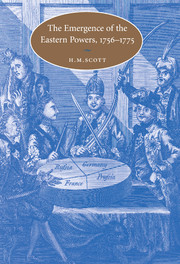Book contents
- Frontmatter
- Contents
- List of maps and genealogical table
- Acknowledgements
- A note on dates and place names
- List of abbreviations
- Introduction: the eighteenth-century European states system and its transformations
- 1 The rise of the eastern powers
- 2 The Seven Years War and the European states system
- 3 The domestic legacies of the Seven Years War
- 4 The stabilisation of Europe, 1763–1766
- 5 Diplomacy and the eastern powers
- 6 From peace to war, 1766–1768
- 7 The partition of Europe, 1768–1772
- 8 The advance of Russia, 1772–1775
- Conclusion: Russia and the emergence of the eastern powers
- Bibliography
- Index
- CAMBRIDGE STUDIES IN EARLY MODERN HISTORY
7 - The partition of Europe, 1768–1772
Published online by Cambridge University Press: 16 July 2009
- Frontmatter
- Contents
- List of maps and genealogical table
- Acknowledgements
- A note on dates and place names
- List of abbreviations
- Introduction: the eighteenth-century European states system and its transformations
- 1 The rise of the eastern powers
- 2 The Seven Years War and the European states system
- 3 The domestic legacies of the Seven Years War
- 4 The stabilisation of Europe, 1763–1766
- 5 Diplomacy and the eastern powers
- 6 From peace to war, 1766–1768
- 7 The partition of Europe, 1768–1772
- 8 The advance of Russia, 1772–1775
- Conclusion: Russia and the emergence of the eastern powers
- Bibliography
- Index
- CAMBRIDGE STUDIES IN EARLY MODERN HISTORY
Summary
The Ottoman declaration of war had, surprisingly enough, not been anticipated by the Russians, who were unprepared for the conflict they now faced. Until the very last moment Catherine II and Panin, preoccupied by Poland and the early stages of important internal reforms, had ignored the gathering storm clouds, believing that the usual resource of bribery in Constantinople could avert any threat. Once Obreskov's imprisonment was known in St Petersburg, however, the Empress and her advisers demonstrated impressive vigour in preparing to fight. An informal Council – which was reminiscent of but did not replicate Elizabeth's Conference of the Seven Years War – was immediately set up. Its establishment was formally announced in mid-February 1769, by which point it had already been in existence for almost three months, and it was given overall responsibility for the conduct of the war and the peace negotiations. This was a reverse for Panin. The new Council challenged not merely his policies, but his position as Catherine's principal adviser and his hopes of establishing himself as First Minister, with responsibility for all areas of government activity, and he opposed its creation. Since 1763 Panin had run Russian foreign policy with the Empress. His ascendancy, however, had been essentially personal in nature, and he had never possessed a secure institutional base, other than his role as senior member of the College of Foreign Affairs. The Ottoman War was to weaken and, ultimately, undermine both his policies and his own position.
- Type
- Chapter
- Information
- The Emergence of the Eastern Powers, 1756–1775 , pp. 187 - 224Publisher: Cambridge University PressPrint publication year: 2001

